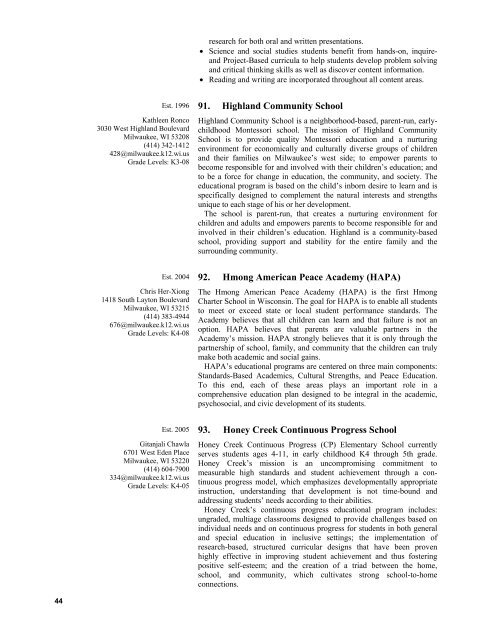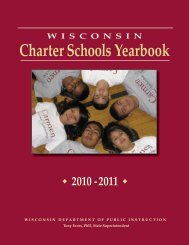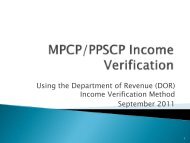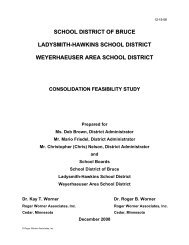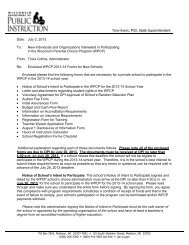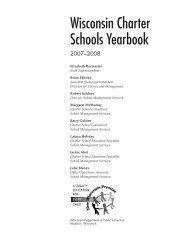2009-10 Yearbook - School Management Services
2009-10 Yearbook - School Management Services
2009-10 Yearbook - School Management Services
You also want an ePaper? Increase the reach of your titles
YUMPU automatically turns print PDFs into web optimized ePapers that Google loves.
esearch for both oral and written presentations.<br />
Science and social studies students benefit from hands-on, inquireand<br />
Project-Based curricula to help students develop problem solving<br />
and critical thinking skills as well as discover content information.<br />
Reading and writing are incorporated throughout all content areas.<br />
Est. 1996 91. Highland Community <strong>School</strong><br />
Kathleen Ronco<br />
3030 West Highland Boulevard<br />
Milwaukee, WI 53208<br />
(414) 342-1412<br />
428@milwaukee.k12.wi.us<br />
Grade Levels: K3-08<br />
Highland Community <strong>School</strong> is a neighborhood-based, parent-run, earlychildhood<br />
Montessori school. The mission of Highland Community<br />
<strong>School</strong> is to provide quality Montessori education and a nurturing<br />
environment for economically and culturally diverse groups of children<br />
and their families on Milwaukee’s west side; to empower parents to<br />
become responsible for and involved with their children’s education; and<br />
to be a force for change in education, the community, and society. The<br />
educational program is based on the child’s inborn desire to learn and is<br />
specifically designed to complement the natural interests and strengths<br />
unique to each stage of his or her development.<br />
The school is parent-run, that creates a nurturing environment for<br />
children and adults and empowers parents to become responsible for and<br />
involved in their children’s education. Highland is a community-based<br />
school, providing support and stability for the entire family and the<br />
surrounding community.<br />
Est. 2004 92. Hmong American Peace Academy (HAPA)<br />
Chris Her-Xiong<br />
1418 South Layton Boulevard<br />
Milwaukee, WI 53215<br />
(414) 383-4944<br />
676@milwaukee.k12.wi.us<br />
Grade Levels: K4-08<br />
The Hmong American Peace Academy (HAPA) is the first Hmong<br />
Charter <strong>School</strong> in Wisconsin. The goal for HAPA is to enable all students<br />
to meet or exceed state or local student performance standards. The<br />
Academy believes that all children can learn and that failure is not an<br />
option. HAPA believes that parents are valuable partners in the<br />
Academy’s mission. HAPA strongly believes that it is only through the<br />
partnership of school, family, and community that the children can truly<br />
make both academic and social gains.<br />
HAPA’s educational programs are centered on three main components:<br />
Standards-Based Academics, Cultural Strengths, and Peace Education.<br />
To this end, each of these areas plays an important role in a<br />
comprehensive education plan designed to be integral in the academic,<br />
psychosocial, and civic development of its students.<br />
Est. 2005 93. Honey Creek Continuous Progress <strong>School</strong><br />
Gitanjali Chawla<br />
6701 West Eden Place<br />
Milwaukee, WI 53220<br />
(414) 604-7900<br />
334@milwaukee.k12.wi.us<br />
Grade Levels: K4-05<br />
Honey Creek Continuous Progress (CP) Elementary <strong>School</strong> currently<br />
serves students ages 4-11, in early childhood K4 through 5th grade.<br />
Honey Creek’s mission is an uncompromising commitment to<br />
measurable high standards and student achievement through a continuous<br />
progress model, which emphasizes developmentally appropriate<br />
instruction, understanding that development is not time-bound and<br />
addressing students’ needs according to their abilities.<br />
Honey Creek’s continuous progress educational program includes:<br />
ungraded, multiage classrooms designed to provide challenges based on<br />
individual needs and on continuous progress for students in both general<br />
and special education in inclusive settings; the implementation of<br />
research-based, structured curricular designs that have been proven<br />
highly effective in improving student achievement and thus fostering<br />
positive self-esteem; and the creation of a triad between the home,<br />
school, and community, which cultivates strong school-to-home<br />
connections.<br />
44


